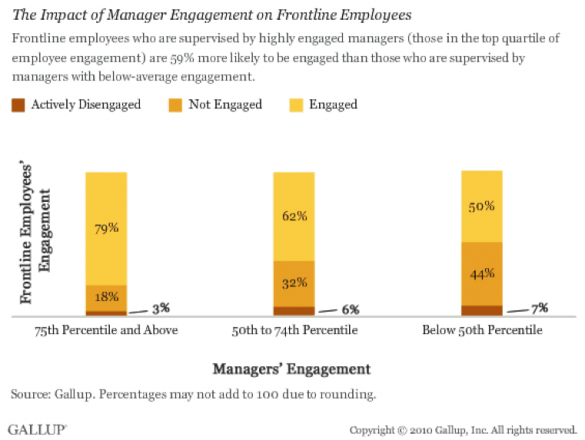The difference between a successful manager, and one who is barely managing to hold it together, is the difference between a team that is successful and one that is barely making their target. In general, a successful manager is able to get much more from their employees than your everyday, run-of-the-mill-type manager. Additionally, a successful manager is engaged in their job, unlike the majority of managers, who are actually disengaged from their job!
A successful manager will get much more than increased productivity from their employees. A successful manager will be able to increase the effectiveness of their employees while increasing the engagement and enjoyment that these employees experience in their jobs. A successful manager is one who is interested in the success of their employees, not just making themselves look good. A successful manager is one who can act in whatever capacity the situation calls for, and knows that they’re making the right call.
That’s a good manager, anyways.
Unfortunately, Gallup’s State of the American Manager survey has found that companies fail to choose the candidate with the right talent for the job 82% of the time. That’s right, according to the experts at Gallup, 82% of the managers in this country lack any natural talent for the role.
Is the existence your last boss making more sense yet?
Still no? Well, we tried.
Traditionally, management positions have been reserved for people who reach a certain level of tenure within a team, a reward for time served and an opportunity to advance even further up the ladder. This tradition, unfortunately, has very little correlation to choosing people with the right talents for management. While having a long working relationship with the people you manage is helpful, it doesn’t help if this relationship has always been strained. This trend of mistaking experience with a team for management potential for a team often favors assertive individuals who, while great at looking out for #1, generally fall short when it comes to helping everyone work together.
People with a natural talent for management, while assertive, use trust and inspiration to build relationships with their employees and motivate them to greater heights in their careers. The best managers are able to make impartial, informed decisions and hold themselves accountable for the results.
Natural talent for management is important, but just because you weren’t born swimming doesn’t mean you can’t learn to do a mean backstroke. By reading more about what traits natural born managers possess, you can work on developing and nurturing these traits in your own management style. Before you can become a better manager, however, we should take a look at what, exactly, makes a successful manager.
What Makes Managers Successful?
Is it minty fresh breath? Is it bringing in a box of bagels every morning? Is it that special sparkle of something, twinkling in their eye?
While all of these things could help a manager in some way, (who wants a manager bad breath?), one of the biggest success factors for any manager is how engaged they are in their job. While this is true for almost any position, a manager’s level of engagement in their job, directly effects the engagement levels of their subordinates. According to the same Gallup survey, Managers account for at least 70% of the variance in employee engagement scores across business units.
Here’s where things start to get worrying. Gallup found that: “A strikingly low percentage — just 35% — of U.S. managers are themselves engaged, while 51% are not engaged and 14% are actively disengaged.” Phrased a little differently, if you have a relatively small business and employ two managers, there’s good chance that one of them isn’t engaged in their job. By extension, the team under the uninspired manager is likely to be disengaged from their work as well.
Here’s Gallup’s visual representation of the effect that disengaged management has on frontline employees:

As you can see above, highly engaged managers get nearly 80% of their employees “Engaged” in their work, unlike unengaged managers, who only get 50% of their employees inspired about work.
What’s more, while only 18% of employees under engaged managers are “Not Engaged,” 44% of employees are “Not Engaged” who work beneath an unengaged manager.
Engagement in their work isn’t the only quality for a manager to have, but it could be the most important. If your managers aren’t engaged in their work, directing your employees to their greatest potential, then it sets a precedent for disengagement at all levels of your company. Instead of promoting managers based on tenure, promote the person who is most engaged in their work and most engaged in the success and wellbeing of their team.
What Skills and Competencies Will a Successful Manager Possess?
While the specific skills required to manage a specific team will vary, successful managers share common skills and competencies that help them to get the most from their employees. These skills and competencies add up to “natural talents” that make some people exceptionally well suited to management positions.
According to Gallup’s “State of the American Manager” survey, these 5 dimensions of talent are the areas that every successful manager should focus on developing:
1. Motivation
2. Assertiveness
3. Accountability
4. Relationships
5. Decision Making
Even if you believe one of these talents to be a weakness of yours, working on fostering these qualities in your management style will help you to get more from your team and your job. Here’s our take on how you should practice these talents in your approach to management.
Motivation
As we discussed before, engaging your employees is one of the most important tasks of any manager. If a manager isn’t motivated to excel in their own job, they will be terrible at getting their subordinates excited about doing anything, let alone working extra hard. If you aren’t engaged in motivating your employees, these employees are at risk of dis-engaging and becoming less productive and happy at work.
People with natural management talent continuously motivate their employees to push the limits of their work. In addition, they are always pushing themselves to greater heights of performance and strive to improve their work, no matter how long they’ve been at a job.
Without a motivated, motivating manager at the head of a team, that team is likely to reflect the disengaged attitude of their boss. A highly motivated, motivating manager, however, will lead by example and set a standard for engagement and enjoyment at work.
If you have been losing motivation to manage, just remember how important your level of engagement is for your employees. Phrased another way: if you’re not sure why you’re doing your job, how do you think the person working for you feels?
When you find motivation or even inspiration in management, your ability to manage and inspire your employees will increase hugely. You don’t have to be painfully positive to get people doing their best and you don’t want the fear of firing to be the only thing getting people to work on time.
If you emphasize an environment in which good work is facilitated and done, daily, everyone is going to enjoy their job more and be motivated to treat their best as a benchmark, aiming at even greater heights than before.
Assertiveness
Assertiveness is key to good management. A successful manager is always in the lead position when it is called for and always commands the attention and respect of their reporting employees. That being said, a successful manager knows that assertiveness is not the right response to every situation. Assertiveness in a sensitive situation or just in situations that don’t require assertiveness is the wrong move, and a successful manager can recognize when and how to use their assertiveness to the advantage of their team.
The nature of managing people, especially other assertive individuals, makes assertiveness a key skill to possess for leadership success. You’re giving directions. You’re passing information down the ladder. You are the one who needs to keep everyone going in the right direction and the one whose responsible for juggling the extraneous details that success always ends up hinging on. Without the assertiveness and confidence to give orders, any manager’s ability to manage and delegate will decrease.
On the other hand, being too assertive can take a team off the rails. If you’ve ever worked for a manager who believed their way to work was the only way to work, you know what we’re talking about. While taking a team off course is bad, an overly assertive manager can completely destroy the harmony in their team. Barking orders, staring down challengers and generally acting like a movie drill sergeant are all hallmarks of an overly-assertive manager.
Without balancing assertiveness with careful consideration and compassion for your team, there is potential for your assertiveness to do more harm than good. Change is the only constant in life, and successful managers will be assertive enough act in the appropriate way at the appropriate time. Assertiveness means sticking your neck out, but it also means knowing that you should be listening instead of talking sometimes. Mainly assertiveness means being there in the right capacity at the right time: whether that’s a traditionally assertive position or a position that is supporting one of your employees or their work.
Accountability
Great managers hold themselves accountable for the success of their team and their success in managing that team. Holding yourself accountable for the success of your team, forces you to take charge of every dimension of that team’s work. Where an average manager facilitates the work that their team is doing, a successful manager is always looking for: ways to improve the way work is done, obstacles to that work being done and workplace problems that affect the lives of their employees. A successful manager creates a culture in which everyone is held accountable for their actions, good and bad.
Figuring out the best way to frame a problem isn’t the same thing as figuring out the best way to solve it. The accountability on your team should permeate all aspects of work, from measuring and reporting the actual progress made on a project to the behavior of individual employees. If you can create a culture of accountability, your employees will be working their hardest to solve the real problems with their work, not work their hardest to look good.
Successful managers hold themselves accountable for the success of their team, but they also do everything in their power to ensure that success. By building a culture of accountability and transparency, your team will be able to focus on doing their best work, not making their manager look good.
Relationships
Along with building strong relationships with their subordinates, successful managers create an environment that promotes the creation of strong relationships between team members and between clients and your company. Building relationships in the workplace is a skill, and not one that everyone is naturally gifted with. While many managers command enough respect for their employees to act chummy while they’re around, this is much less valuable than the genuine relationships that can be formed through trust, accountability and hard work.
Forming relationships with employees will help any manager to get the most from those employees. On the job, a manager who has a good relationship with an employee will be able to communicate more efficiently with that employee and notice warning signs that they are slowing down or have trouble at home. Creating this environment will help everyone to feel supported at work and your customers will love interacting with such positive people!
What’s more, according to the Gallup study, employees whose managers are open and approachable are twice as likely to be engaged at work, than employees who don’t feel they can approach their manager.
Having strong relationships with employees will also help managers in their future hiring efforts. If you can form a strong relationship with the best workers on your team, then this relationship can endure even after they’ve left your company. After finding new jobs, these former employees will be able to provide you with contacts that they make in your industry and refer the best talent your way.
Successful managers are able to form special, enduring bonds with the people who work for them. By emphasizing relationship building in your management style, you can create an environment in which work is done with friends, not just co-workers.
Decision Making
Successful managers are great decision makers and will pro-actively plan strategies and anticipate complications that can hold their team up. Split second decisions are rarely called for in business, and deliberate decision making is much more important in a manager than in many other positions.
For instance, let’s say you were to promote a longtime salesman to manager, believing his self-described “gut instinct” will make him great for managing his team. Fast forward 6 months, and this guy has “decided” that half of his team wasn’t up to his new, more rigorous standards. Though he has made a few decent hires, he’s already gone over his staffing budget and keeps “deciding” that every candidate he meets isn’t fit to eat the welcome mints. While this guy’s “gut instinct” may have made them a great salesman, their snap decision-making ended up causing a huge disruption to their team.
Successful managers consider all avenues and evidence before making a decision. Further, after coming to this informed, deliberate decision, they will explain this decision to their team and the reasoning that went into it. Now, many workplace situations will call for discretion, but your employees will appreciate you showing them your decision making process, when you can.
By making decisions deliberately, you will be able to facilitate difficult situations for your employees and improve the way that work is done through decisive action.
So, to recap, high-talent, high-success managers:
Are Motivated in their jobs and motivate employees to do their best work.
Are Assertive enough to handle difficult situations.
Are Accountable for the success of their team.
Are focused on building Relationships.
Are deliberate Decision Makers.
Successful managers are able to lead by example, but can still form strong relationships with their employees.
Successful managers are assertive decision-makers, but they also hold themselves accountable for their actions.
Successful management requires striking a balance between strength and flexibility, dancing a line between leading your employees and working with them. By following these management best practices, you can get more from your employees while ensuring that they are having an engaging, positive work experience.
Archives
- October 2024
- May 2024
- March 2024
- February 2024
- January 2024
- December 2023
- November 2023
- October 2023
- September 2023
- August 2023
- July 2023
- June 2023
- May 2023
- April 2023
- March 2023
- February 2023
- January 2023
- December 2022
- November 2022
- October 2022
- September 2022
- August 2022
- July 2022
- June 2022
- May 2022
- April 2022
- March 2022
- February 2022
- January 2022
- December 2021
- November 2021
- October 2021
- September 2021
- August 2021
- July 2021
- June 2021
- May 2021
- April 2021
- March 2021
- February 2021
- January 2021
- December 2020
- November 2020
- October 2020
- September 2020
- August 2020
- July 2020
- June 2020
- May 2020
- April 2020
- March 2020
- February 2020
- January 2020
- December 2019
- November 2019
- October 2019
- September 2019
- August 2019
- July 2019
- June 2019
- May 2019
- April 2019
- March 2019
- February 2019
- January 2019
- December 2018
- November 2018
- October 2018
- September 2018
- August 2018
- July 2018
- June 2018
- May 2018
- April 2018
- March 2018
- February 2018
- January 2018
- December 2017
- November 2017
- October 2017
- September 2017
- August 2017
- July 2017
- June 2017
- May 2017
- March 2017
- February 2017
- January 2017
 RSS Feed
RSS Feed
Subscribe to Orion's Blog
Featured Blogs





.jpg)















